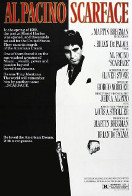
Directed by
Brian De Palma
170 minutes
Rated R
Reviewed by
Bernard Hemingway


Scarface (1983)
Synopsis: It is the early 1980s and Tony Montana (Al Pacino) is a small-time hoodlum who has arrived in America from Cuba determined to be a success. His opportunity comes when he is hired to kill a former Castro henchman and from there, his rise to Miami drug-lord is inexorable. Along the way he meets Elvira (Michelle Pfeiffer) and reclaims his sister Gina (Mary Elizabeth Mastrantonio) from the confines of his God-fearing mother. Neither relationship works out well.
Brian De Palma was one of the young guns of the New Hollywood of the 1970s - a generation which included William Friedkin, Martin Scorsese, and Francis Ford Coppola. Although made in 1983. when that phenomenon was well and truly over, Scarface is best understood as the antiphon to Coppola's 1972 benchmark film, The Godfather. That both films had Al Pacino playing the central character only serves to heighten their inverted relationship. Whereas Coppola ennobled his characters with a sense of personal dignity and familial respect and shrouded their activities in a sub-cultural ethic, De Palma's protagonist is chronically alienated from his Cuban origins, from his family and from himself. Whereas Michael Corleone surrendered his personal ideals, Tony Montana is his exact opposite - a man dedicated to his personal gratification. If Michael epitomized the civilized facade of organized crime, Tony is the darkness lurking in its sociopathic heart. Both directors took a distinctively American film genre (De Palma's film is based on the 1932 Howard Hawk film of the same name) and re-worked it with a sense of, if not grandeur, then the grandiose. Given that both films deal with violence as a way of life, Coppola's film is the more palatable and, despite its subject matter, has won wide critical acceptance as a tour-de-force of cinematic panache. However, particularly thirty years on, when we are so much more accustomed to wholesale screen violence, De Palma's pumped-up, blood-soaked gutter trash melodrama deserves to be recognized as its unsavoury sibling.
The film begins powerfully with footage of contemporary news coverage of Cuban refugees arriving en masse on American shores after Castro declared a brief amnesty on his people leaving their homeland. His jest was that the people he allowed to leave were those he wanted to get rid of. To dump Cuba's trash on capitalist America only added to the joke.
Giorgio Moroder's bass-heavy synthesizer music effectively builds the sense of anticipation and foreboding in what we rightly anticipate will be yet another chapter in America's immigrant history. The American Dream that has gripped the imagination of so many poor and dispossessed people around the globe is very much a central element of De Palma's film (Hawk's film was based on the life of another immigrant, Al Capone) and we are shown the two sides of it - on the one hand anonymous toil for factory wages but a new life for the kids, on the other, an any-way-you-can grab for riches.
The movie was written by Oliver Stone and its subject matter and themes - a story of greed and lust, testosterone-driven violence and the underbelly of American values - is grist to his mill. His work is perfectly attuned to De Palma's own taste for cinematic excess (and here let's give credit to John A. Alonzo's fluid cinematography and Nando Scarfiotti's wonderfully kitsch production design).
The element that binds the writer and director's intense vision is Al Pacino. From the first shot of Tony's hard-as-stone face we know that we are in the presence of someone whose contempt for those around him is boundless. Pacino has played more than his fair share of hoodlums but his Tony Montana is no off-the-shelf performance and here his inhabiting of his desperately nihilistic character is remarkable. It is his most memorable and arguably his best-ever performance.
Scarface has long been a cult favourite and, predictably, has a large following amongst America's Latino hip-hop youth. It is thuggery given its full-blown romantically-fatalistic, hyper-stylized cinematic apotheosis.
Want something different?





